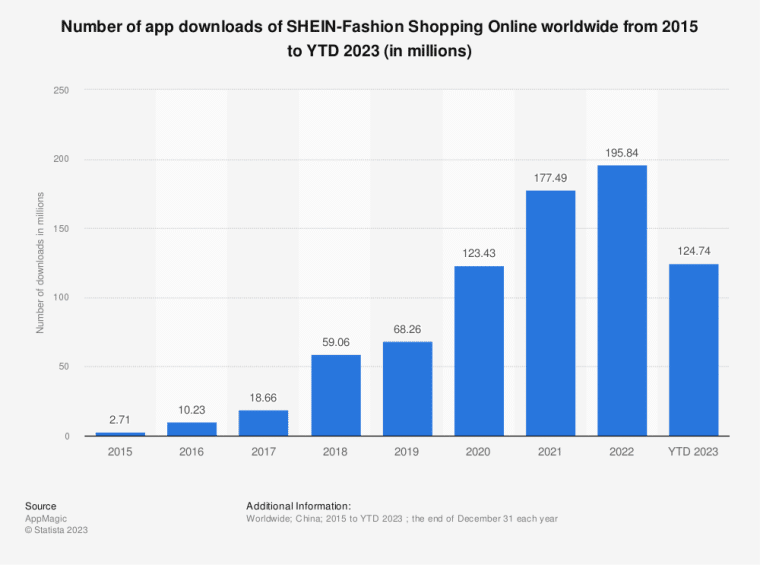
Chinese fast-fashion firm Shein is facing a lawsuit filed by a group of designers who allege that the company repeatedly stole their works as part of a pattern of racketeering.
The designers, Krista Perry, Larissa Martinez, and Jay Baron, claim that Shein has used artificial intelligence (AI) to create exact copies of independent artists’ designs, thereby damaging their careers, according to the lawsuit.
Shein, valued at $66 billion, has been accused of repeatedly stealing independent artists’ works through its design “algorithm.”
“Shein has grown rich by committing individual infringements over and over again, as part of a long and continuous pattern of racketeering, which shows no sign of abating,” the suit alleges.
The lawsuit argues that Shein’s AI-generated copies have caused significant harm to the careers of these artists.
While the exact nature of Shein’s AI design process remains unclear, the lawsuit claims that it involves the creation of exact copies that infringe upon copyrights.
They argue that Shein’s actions violate the Racketeer Influenced and Corrupt Organizations Act (RICO), a federal statute targeting organized crime and white-collar crime.
The designers claimed that RICO is applicable to this case since it addresses the misconduct of individual parties within a larger enterprise. Seeking a jury trial, the designers claim that Shein’s misconduct is not limited to a single entity but rather a de-facto association of entities.
New copyright/RICO lawsuit against Shein accuses the business of operating as a "dizzying and ever-changing decentralized amalgamation of companies."
Plaintiffs say Shein is run by "a mysterious tech genius, Chris Xu, about whom almost nothing is known."
1/ pic.twitter.com/3c2aMS9Gc6— Rob Freund (@RobertFreundLaw) July 11, 2023
In response, Shein has refuted the allegations, stating that it will vigorously defend itself.
As one of the fastest-growing online retailers globally, Shein has faced prior allegations of mistreatment towards artists, workers, and the environment.
The company has previously been found guilty of violating local labor laws.
Artists Found Their Work On Shein
One of the designers involved in the lawsuit, Krista Perry, from Worcester, Massachusetts, discovered copies of her graphic poster titled “Make It Fun” for sale on Shein and its sister site, Romwe.com.
When Perry contacted Shein to protest the infringement, she received an offer of a mere $500.
“Shein made its offer as if it were a mom-and-pop operation rather than one of the richest enterprises in the world,” the suit alleges.
Perry suffered “substantial damage to her business in the form of diversion of trade, loss of profits, and a diminishment in the value of her designs and art, her rights, and her reputation,” the lawsuit adds.
Other designers, Jay Baron from Burbank, California, and Larissa Blintz from Los Angeles have also accused Shein of copying their designs. Baron’s artwork, “Trying My Best,” and Blintz’s clothing design, “Orange Daisies,” were allegedly replicated without their consent.
It is worth noting that the decentralized structure of Shein poses challenges for designers seeking justice.
The lawsuit emphasizes that Shein is a continuously changing association of entities and individuals, making it difficult to identify responsible parties.
Even those with attorneys often face difficulties finding appropriate defendants.
To overcome these obstacles, the designers have invoked the RICO Act, which was created to address the misconduct of individual participants within larger enterprises.
The founder of Shein, Chris Xu, also known as Xu Yangtian, is a Chinese entrepreneur with a Forbes-estimated net worth of over $10 billion.
However, little is known about his background, with varying reports about Xu’s origins and education, which adds to the mystery surrounding the founder of the Shein empire.
Chinese Apps Gain Ground in the US
Chinese apps have been rapidly gaining popularity among American users despite concerns about data privacy and security.
As reported, 10 out of the 500 most downloaded apps so far in 2023 are from Chinese companies.
Furthermore, four of these Chinese apps are in the top five, which signifies their increasing impact on the US app market.
TikTok, CapCut, Temu, and Shein are among the most popular Chinese apps in the US, with each app ranking in the top 20 most downloaded apps.
Temu and Shein have also taken the online retail market by storm, dominating app download charts in the first quarter of the year.
According to a report from Statista, Shein gained nearly 125 million app downloads across the world between January 1 and June 15, 2023.
In 2022 alone, the fast-fashion giant was downloaded more than 195 million.

Notably, US lawmakers have been to taking an increasingly aggressive stance against Chinese apps as US-China tensions remain high.
Back in May, a US congressional commission called out Shein and Temu in a report that suggested the companies and others in China were potentially linked to the use of forced labor, exploitation of trade loopholes, product safety hazards, or intellectual property theft.
While concerns about data privacy and security have been raised, these apps continue to be popular among users.
In 2021, four Chinese apps were among the top 50 most downloaded apps in the US, with only one of them ranking in the top five. In 2022, there were three Chinese apps in the top 50, with TikTok maintaining the top position.